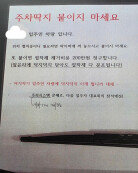Battered White Collar Workers
Mr. K says, I feel so bitter against the society for putting me in this heap of debt overnight, because I neither gambled nor indulged in luxury.
Korean white collar workers are facing a crisis.
They have long lost their dreams of gaining a sound workplace, financial wealth, and a happy family since being laid off in the wake of the 1997 financial crisis. Some try for a new start by taking up contract-based jobs, others jump into self-employment businesses, but many end up in failure.
Those who were fortunate enough to preserve their positions are also undergoing extreme anxiety amid job insecurity and intense labor caused by continuous restructuring.
More than half of white collar workers have fallen into the lower class, either from taking blue collar jobs or assuming contract-based work during the financial crisis in 1997, according to a paper to be released next month and co-authored by Shin Gwang-young, Jo Don-moon, and Lee Seong-kyun, professors of social science at Chung-Ang University, Catholic University of Korea, and the University of Ulsan, respectively.
The majority of white collar workers who fell to the lower class are still engaged in small-scale businesses or blue collar jobs, professor Shin noted.
This white collar crisis also applies to industrialized countries, including the U.S. In the 21st Century, with increases in debt and stock investment losses, labor polarization within a class is pronounced and is represented by high-wage specialized jobs and low-wage work among white collar employees.
However, a sociology professor at Yonsei University, Kim Wang-bae, provided a diagnosis, saying, The collapse of the white collar workforce is a worldwide trend, but Korea has more cause for concern as falling of this class there is faster with job insecurity and loss of family bonds in a short time.







